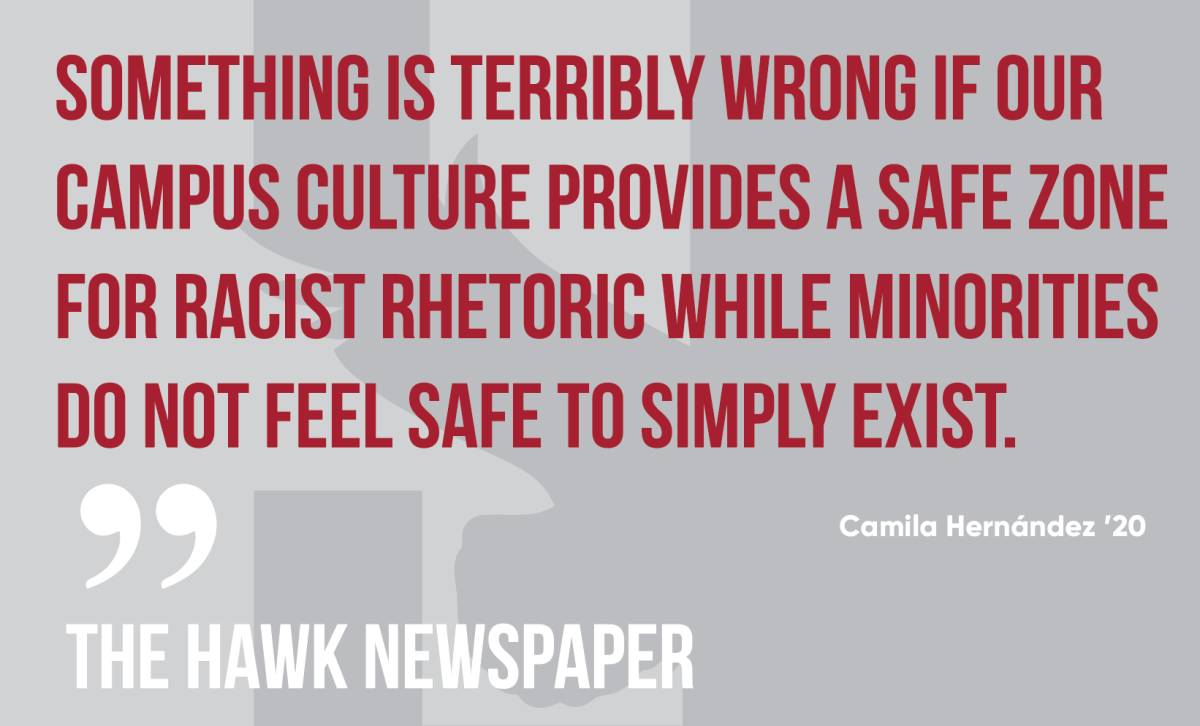One of the international students quoted is identified in the story by initials. The students spoke on the record, but requested not to use her full name since she is on a student visa and fears retribution in response to her comments.
Every afternoon during the school week, Laura Fuentes Pou ’21 and her friends gather in Campion Food Court, mostly to catch up about their day. Sometimes they meet in the library too.
Because Fuentes Pou and her friends are all from Spanish-speaking regions like Panama and Puerto Rico, their conversations are in Spanish.
Once, when Fuentes Pou was leaving the library, someone used a racial slur, commenting on how loud the students were.
Fuentes Pou, who is from San Juan, Puerto Rico, said it’s not the first time she has heard that slur on campus. But usually people don’t say it to her face.
“People have the decency to do it in their own personal groups,” Fuentes Pou said. “Usually they don’t say it to us.”
Fuentes Pou said she and other students who identify as Hispanic/Latinx face microaggressions connected to their race on a daily basis, inside and outside the classroom.
She said the university’s attention to the bigger, more public acts of racism misses the point.
“This happens every day,” Fuentes Pou said, “like literally every day. I know that the incidents are very big but that doesn’t mean it is the only thing that has happened.”
On the St. Joe’s website, diversity numbers are only offered for first-year students. For the class of 2023, 8.9% of first-year students identify as Hispanic/Latinx.
When asked about the number of Latinx students in St. Joe’s total population, Wadell Ridley, interim chief inclusion and diversity officer, pointed to the website of the National Center for Education Statistics (NCES). According to the NCES page, which was last updated in the fall of 2018, 7% of the undergraduate student population at St. Joe’s is Hispanic/Latinx.
Camila Hernández ’20 spent the first six years of her life in the U.S. Her dad is Venezuelan, and her mom is Colombian. After leaving the U.S. as a child, she has lived in Spain with her mother.
“Something is terribly wrong if our campus culture provides a safe zone for racist rhetoric while minorities do not feel safe to simply exist,” Hernández said.
Hernández said she expected more inclusivity from her college experience in the U.S.
“You look around campus, and it’s very segregated,” Hernández said. “I know all my friends are Hispanic, I have one American friend, and she’s black. You see a lot of black students together and then everyone else just doing their own thing. When I started college, I thought I was going to have more of a diverse experience.”
L.D., an international student from Central America who requested that The Hawk only use initials, said students and faculty frequently comment on her English skills or the color of her skin, deeming her “too white” to be Latinx. She said some students seemed surprised that she can speak English so well. Some professors assume she cannot.
“A professor said, ‘I don’t understand your accent, please go to the board and write what you are saying.’” L.D. said. She said that during her freshman year when she raised her hand to ask what a word was on the whiteboard the professor responded, ‘I knew you were going to ask what it means, but I’m not going to tell you.’
“It was for a quiz,” L.D. said. “He said that in front of everyone. It’s just little things, but they are still very embarrassing.”
For many of the Latinx students interviewed by The Hawk, racism is a new experience here at St. Joe’s. It wasn’t something they dealt with in their home countries.
“There isn’t much racism at all, so what we would see would be from the United States like the news, Twitter, Facebook, and all that,” Fuentes Pou said of her experiences in Puerto Rico. “We just got told to be careful. We don’t come from a place where it’s normal.”
L.D. said she also never experienced racism in her home country.
“I never experienced racism until I got here,” L.D. said. “It’s gotten worse with [President] Trump. I never grew up knowing what racism was.”
Both L.D. and Hernández said the Nov. 4 University Forum held to address racism on campus was not enough.
“When you’re bringing together the people that are not racist, that’s not going to effect change,” Hernández said. “An idea would be to implement a mandatory class discussion on racism, once a year or once a semester, in lieu of regular class time. We must remember that racism is taught and, therefore, can be untaught.”
L.D. said any discussion needs to involve students who experience racism on a daily basis.
“I just feel like this problem isn’t going to be fixed with a forum,” L.D. said. “There’s way more than that. And having just American students discuss this is not going to help because they don’t experience it at all.”
Hernández added she is disappointed that some of her peers at St. Joe’s are engaging in racist behavior.
“To see a younger generation still with the same ongoing issues, for one, it’s very disheartening,” Hernández said. “And honestly, if you’re racist in 2019, you just suck. I don’t get it. I just don’t understand.”



































